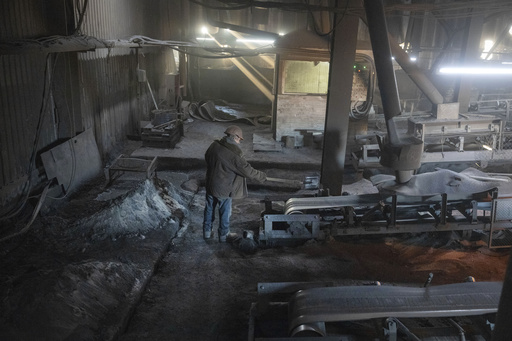
Ukraine is home to extensive ilmenite reserves, a crucial resource for titanium production, found in the heavy mineral sands stretching across the country’s conflict-affected eastern regions.
However, much of this vital minerals sector remains underdeveloped, hampered by ongoing conflict and stringent government regulations.
This scenario may shift if a potential agreement between the U.S. administration and Ukraine materializes, involving an exchange of critical minerals for ongoing American military support.
In Kirovohrad, one open-pit ilmenite mine stands as a promising source of valuable minerals, with its owner eager to partner with American firms. Yet, challenges abound, including costs, licensing agreements, and the necessity for security assurances that would make such partnerships feasible.
Ukrainian President Volodymyr Zelenskyy stated during the Munich Security Conference that he refrained from allowing his ministers to finalize a mineral resource agreement with the U.S., as the draft was not adequately protective of Ukraine’s interests.
Additionally, some Ukrainian entrepreneurs familiar with the mineral sector have privately expressed doubts regarding the feasibility of such a deal. Given the capital-intensive nature of the industry, they note that anticipated returns may take years or even decades to materialize, considering the current lack of geological data, which is often limited or classified.
“The primary benefit we could gain is security assurances through economic cooperation, making it in the interest of a stronger partner to protect us,” stated Andriy Brodsky, the CEO of Velta, a prominent titanium mining firm in Ukraine.
The aspect of security guarantees is a crucial point of concern as a potential agreement could bolster the relationship between Kyiv and the U.S. administration.
The U.S. plays a significant role in the consumption of critical raw earth minerals like lithium and gallium, both of which are present in Ukraine’s subsoil.
While U.S. interests have mentioned the potential of rare earth elements, industry experts point out that these supplies are not yet thoroughly explored. Titanium, essential in aerospace and defense, is in high demand, and the U.S. is a major importer of ilmenite, which can help lessen future dependencies on Russia and China.
In return for its minerals, Ukraine hopes to maintain a steady flow of American military resources, vital for countering future aggression from Russia, especially in the context of a potential ceasefire.
However, securing guarantees remains a pivotal issue, with U.S. companies indicating their willingness to invest only if they can ensure their substantial investments will be protected against potential renewed conflicts. Brodsky articulated that the mere presence of American business operations in Ukraine could serve as a deterrent against external threats.
“If this initiative gets underway, it will continue to grow,” Brodsky expressed. “Once investments reach significant figures, American business interests will prompt action to defend their profitability in Ukraine against any threats.”
Growing interest from American firms appears to be changing the discourse, according to Brodsky, who recently returned from meetings in Washington and New York.
“Many influential figures are acknowledging that we are poised for the right opportunities at this critical moment,” he noted, reflecting optimism for potential partnerships.
Over the years, Velta has fostered relationships with American partners, and Brodsky is currently negotiating with those he sees as potential allies should a formal agreement be reached.
Historically, Ukraine has not attracted foreign investment due to unfavorable government policies that lack incentives for foreign players. Brodsky believes that collaboration with local firms is essential for international companies to succeed within Ukraine.
Ksenia Orynchak, from the National Association of Extractive Industries of Ukraine, elaborated on the challenges, indicating that navigating the bureaucratic landscape in Ukraine is an arduous task. She suggested that American companies would likely benefit from partnering with existing local license holders to ease entry into the market.
Orynchak further noted the need for additional geological exploration, suggesting that existing data may have been compiled under questionable motivations, as some geologists previously benefitted from exaggerating reserve claims in the Soviet system.
“In the past, some geologists claimed larger reserves to gain favor,” she revealed.
She recommended that American investors lower current exploration thresholds since bidding can occur in areas where reserves are merely presumed rather than confirmed.
“This approach is misguided, as we risk selling something without properly validating its value,” she cautioned.
At the extraction site, workers are surrounded by a cloud of ilmenite dust, sparkling in the sunlight that filters through the environment.
Their faces are covered in residue as they dedicate hours to extracting the precious mineral from the sand.
Utilizing a gravity separation technique, unwanted materials are filtered out, and wet conditions are a given for workers engaged in this labor-intensive process.
Velta originated from an expired exploration license and a $7 million business plan when Brodsky took charge. It took years—and substantial financial investment—before he could consider the possibility of generating production.
The prospective agreements raise another critical topic concerning the local populace’s stance. According to Ukrainian constitutional law, subsoil resources belong to the state, leading to concerns about community perceptions regarding foreign involvement.
“There are growing concerns among locals about ceding resources,” Orynchak commented on public sentiment.
Workers at the Velta mine shared similar apprehensions, with one stating, “Would you allow an outsider to harvest your home garden?”
The inherent risks of the industry have fostered doubts among some Ukrainian businessmen regarding the viability of the proposed deal.
After learning of the arms-for-minerals transaction idea, one businessman cynically remarked, “This sounds unrealistic,” explaining the enormous capital requirements necessary for mineral extraction—potentially costing billions rather than millions.

